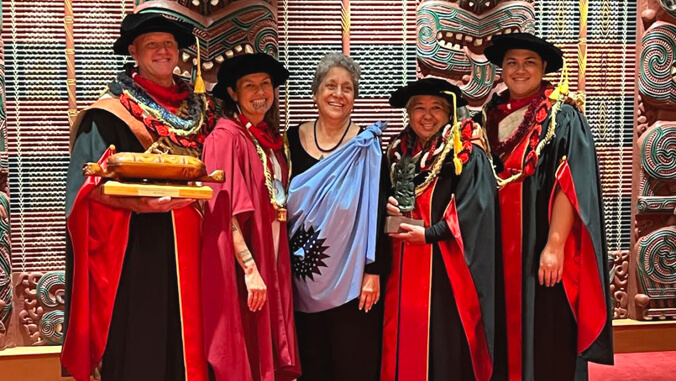
Column by University of Hawaiʻi Maui College Chancellor Lui Hokoana was published by the Maui News on October 24, 2022.
The conferring of a PhD is a thrilling experience for any candidate. It marks the culmination of years of hard work and sacrifice and is possible to achieve only with the support of family, friends, and colleagues. Our newest PhD scholars have each just had that experience as part of a graduation ceremony unique in the world. It took place at Te Whare Wānanga o Awanuiārangi in Whakatāne, Aotearoa, the only educational institution offering Doctorates in indigenous studies.
Dr. ʻŌhai Daniels (Administration of Justice Program Coordinator), Dr. Lei Ishikawa (Internship Coordinator of Ka Hikina o Ka Lā and Coordinator of Kahōkūala), and Dr. Shavonn Matsuda (Head Librarian) were three of thirteen graduates who received their Doctor of Philosophy in Indigenous Studies degrees. Dr. Daniels also received the special award: the Emeritus Professor Roger Green ONZM Award for Top Thesis and Dr. Ishikawa also received the special award: Te Iwi Taketake Award for Outstanding Indigenous Research.
Two graduates were from First Nations of Washington State; the rest from Aotearoa. The cohort is believed to be the largest of such graduates in the world, ever. It was also a celebration of the Wānanga’s 30th graduation. “To be in that space, to be part of a very indigenous-focused celebration, surrounded by indigenous people was amazing,” says ʻŌhai. The other scholars agree.
Each scholar focused on a unique area of Hawaiian cultural practice, one that is personally meaningful to each of them. ʻŌhai studied koko puʻupuʻu, a knot used to make carrying nets found in Hawaiʻi and nowhere else on earth. Lei, who has been making kapa for many years, researched the reclaiming of cultural identity and mauli ola (well-being) through kapa making. Shavonn sought to improve intellectual access to ʻike and better represent Hawaiian knowledge in libraries by examining Hawaiian epistemologies. More broadly and, perhaps more importantly, their studies were aimed squarely at the reclamation, perpetuation, preservation, and the organization of Hawaiian wisdom through these practices.
For Shavonn, indigenous research methodologies are hugely important. “It’s crucial for Kanaka to participate in and lead research ‘by us, for us.‘ Throughout my undergraduate and Master’s studies, I faced many barriers to doing genealogy and land research in ‘traditional‘ libraries. We had to learn a Western system to access our own knowledge. I wanted to become part of the solution and meaningfully improve access to Hawaiian knowledge—to work together with our communities to identify pathways to reclaim and put that knowledge into practice,” she explains.
The importance of scholars’ support systems was powerfully on view in every aspect of their studies and their graduation. Professor Mera Penehira, the head of the School of Indigenous Graduate Studies, provided invaluable support as the cohort’s advisor starting the journey with them from the beginning in the summer of 2017. She met virtually with the scholars on a regular basis—at least once a week in most cases—guiding them to the successful completion of their projects.
The scholars’ families were the hearts of their support systems. “We first brought our families in 2017 when we started the program,” explains Lei, “so they could learn what we would be going through, so they could support us in this effort.” All their family members were invited and embraced throughout their graduation visit.
And the entire community of Whakatāne embraces the Wānanga. “The community owns it,” says ʻŌhai. The community comes out in force to support it, from local businesses to elementary school children. Everyone is a part of the greater whole.
Another of our PhD scholars, Dr. Hōkūlani Holt accompanied the scholars as our college’s representative. “Being at the doctoral graduation of three UH Maui College colleagues was quite moving indeed,” she says. “They were given the highest honor possible from Te Whare Wānanga o Awanuiārangi and represented Maui and Hawaiʻi exceptionally well. As they walked up to receive their doctorate degrees, they brought with them their ʻohana, their ʻāina aloha, the wisdom and knowledge of generations of kūpuna, and the pride of being kānaka ʻōiwi.”
Now, the beneficiaries of their experience, research, and wisdom are our college, our community, our Hawaiʻi. As Lei says, “We are all practitioners. Now we’re practitioners recognized by the academic world, and most importantly, by our lāhui in our cultural practices. We’re telling our own story.”
And there’s something else they want you to know. If you want to embark on a similar journey, they are here for you. They will encourage you, inspire you, and help you. Hoʻomaikaʻi to Dr. Daniels, Dr. Ishikawa, and Dr. Matsuda. We are so proud of you!

